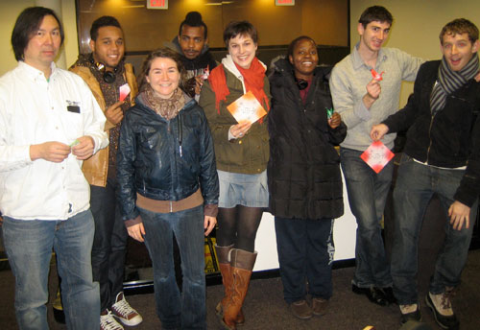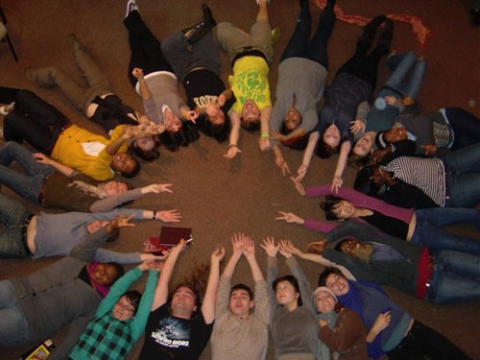Leading a Cultural Conversation

Members of the Cultural Leaders include, from left to right, David Lee, Terence Washington, Lisa Forkish, Don Ngatta, Gabriela Martina, Angelina Mbulo, Paul Dougherty, and Matthew Hines.
Photo courtesy of Gabriela Martina

From the Cultural Leadership Retreat
Photo courtesy of Gabriela Martina
When she arrived at Berklee in 2008, Gabriela Martina says she felt isolated from her African American classmates in some of her ensembles.
But the white vocalist from Lucerne, Switzerland channeled her frustration into educating herself about other cultures. She took an Africana Studies course and Afro American Culture and History I, and went to see anti-racism activist Tim Wise speak when he came to campus last year. Meanwhile, this past summer, while at home in Switzerland, she delved into books and DVDs about African American culture and history.
Back at Berklee, Martina took it a step further. While the college has offered myriad lectures, discussions, and workshops to promote multiculturalism and diversity, Martina was surprised to learn no student club currently served as a dedicated forum for discussions on race and racism; she asked Kevin Johnson, multicultural educator/program manager with Berklee's Office for Cultural Diversity, if she could found one.
"She was brave enough not only to research and learn about it, but to voice her concern to me and others," says Johnson.
Martina created an anti-racism group. But after she attended a Cultural Leadership Retreat in October, it became clear the group needed to cast a wider net to provide a medium to talk about not only race, but also issues surrounding gender, sexual orientation, ethnicity, and religion, for example. Berklee Cultural Leaders was born.
"Our meetings have a very peaceful atmosphere. Everyone's story counts," says Martina, a seventh-semester professional music major and voice principal. "The goal is to achieve open-mindedness. . . to find a better way to live together."
Says Johnson, who serves as a mentor and advisor to the newly formed group: "I think Berklee Cultural Leaders specifically has addressed and is looking to address self-segregating issues here. Berklee is one of the most diverse places I've ever been, but you go to the library and the cafeteria and there is definitely self-segregation happening." While this can be natural and healthy, it's also important to bridge these divides, Johnson points out.
Other groups, such as the Black Student Union and a Cultural Diversity Committee, have addressed racism. But Berklee Cultural Leaders offers a new way of thinking about race and racism through its multilayered and comprehensive approach, Johnson notes.
The group—which is open to students, faculty, and staff, and has about 70 members—has held two eye-catching, thought-provoking events, poignant in their subtlety.
Channeling a Japanese symbol for peace, harmony, and hope, the group folded white origami paper cranes and dropped them around campus a week before the anniversary of the Japanese attack on Pearl Harbor. A week later, on December 7, the group reprised the crane drop, but this time with colored cranes to reflect diversity. The origami pieces featured information about Cultural Leaders, including its motto: "Listen, Connect, Speak Up."
Also on December 7, courtesy of the group Improv Everywhere, Cultural Leaders staged a "Freeze Mob" on the "Berklee Beach"—the stretch of sidewalk in front of the 150 Massachusetts Avenue buildilng—encouraging passersby to freeze in motion at the blow of a whistle. "The idea is to create a new language, take you out of your comfort zone, do something random," says Martina.
The same day, the group set up an informational table in the 150 building to teach people how to fold the origami cranes and to share information about Cultural Leaders.
"We talk about our experiences with people. We want to build up a better sense of community, find a better way to communicate about these issues, and have an open dialogue," Martina says of the group.
To learn more about Berklee Cultural Leaders, visit the group's blog.
